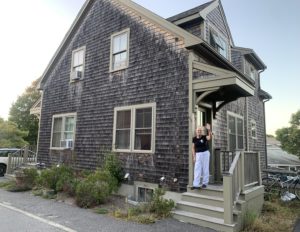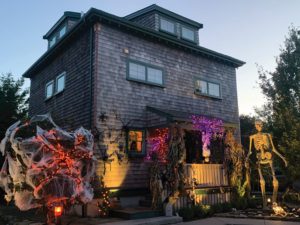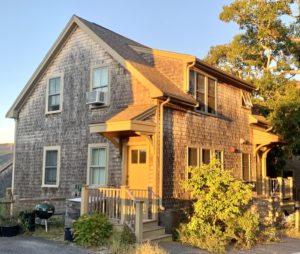EASTHAM — At the Cape Cod Commission’s annual conference last month, Eastham Community Development Director Paul Lagg made a brief presentation on his town’s new zoning task force, which began meeting in 2021. For the housing advocates in the room, the key lesson was the successful process Eastham had used: a small group that included one member from the planning board, one from the zoning board of appeals, and one from the affordable housing trust, plus a few at-large members, met every two weeks for nearly a year. The nine bylaw changes they eventually recommended got unanimous votes from the planning board and select board and near-unanimous support from the finance committee, and they easily cleared the two-thirds vote threshold at town meeting.
The more experience one has with zoning, the more impressive this sounds, because zoning reforms typically fail.
“All you need is one person at town meeting to get up at the microphone and start asking questions,” said state Rep. Sarah Peake. “Half the people in the room don’t understand the answers, and then they’re like, ‘This could affect my resale value, or we might suddenly have skyscrapers. I better vote no.’

“I think it’s the fear of the unknown,” Peake added, “but over and over again, these bylaw changes fail at town meeting.”
It’s not just voters who fear zoning discussions. Peake and former Cape and Islands state Sen. Dan Wolf struggled for years to enact a statewide zoning reform bill in the legislature. It never came to a vote in either chamber.
“It’s a mind-numbing subject,” Peake said, “and part of the reason we didn’t get this two-inch-thick bill done is because everybody is like, ‘I can’t even begin to dig into this.’ ” Zoning is “incredibly important to communities,” Peake added, but it rarely feels urgent.
The most controversial part of that bill did eventually pass as part of last year’s Housing Choice law, Peake said — perhaps because it was the easiest to understand. Towns are now allowed to adopt a simple majority rule, instead of a two-thirds majority, for zoning bylaw changes. The new rule cannot be used at the same meeting that adopts it: it must pass at one town meeting and then will apply at future town meetings.
No towns on the Outer Cape have put this measure on their warrants, however. The Housing Choice law passed in February 2021.
Eastham’s Reforms
Not all of the measures Eastham’s residential zoning task force advanced last spring were groundbreaking. Some were “housekeeping,” cleaning up oversights in the bylaws, Lagg said. But the town also adopted an inclusionary bylaw, expanded its cottage conversion bylaw, and legalized duplexes across nearly the whole town.

Inclusionary zoning mandates that developments over four units include some affordable or workforce housing. “Inclusionary has been around for a long time, many communities have it, so we just needed to get this on the books,” Lagg said.
Eastham’s cottage colony bylaw had forbidden year-round occupancy, which the task force reversed, Lagg said. The town also added motels and hotels to the bylaw, so they can now convert into multi-family housing.
“We wanted to set up for whatever may happen in the future with these commercial properties,” Lagg said. “The catch is, if they want to convert, they have to create either owner-occupied, year-round rentals, or seasonal rentals.” A long-term covenant with the town is required for a conversion, and second homes and short-term rentals are not permitted.
The task force also wanted to create “housing diversity,” Lagg said — housing options that are sometimes called the “missing middle” in between dense apartment buildings and single-family homes. Duplexes, row houses, triple deckers, and Victorian flats are types of home construction that have long been illegal in single-family zones.
Since 1988, Eastham’s minimum lot size for new construction has been 40,000 square feet, or just under an acre. A duplex required 80,000 square feet. Most of the town’s lots preceded the 1988 rules and were considered “pre-existing nonconforming,” and some of them had prior rights to build duplexes — but both units had to be deed-restricted to affordable rentals, although one could be owner-occupied. No one had built a duplex under those affordability rules since 1988, Lagg said.
The task force eliminated the affordability rules and made duplexes a legal use throughout the town, on an equal footing with single-family homes. Only in the National Seashore District are single-family homes permitted and duplexes still excluded.

“We have a zero percent vacancy rate, we have no rentals, and we need to just create units,” said Lagg. The task force included an owner-occupancy or year-round rental covenant for new duplexes in place of the former affordable rental deed restriction.
“You could have co-owners living on each side,” said Lagg. “What we’re trying to do is prevent further short-term rentals.”
Especially when short-term rental is not allowed, duplex units are cheaper than single-family homes. “Empty-nesters who want to downsize, young professionals with no kids — when you have options other than single-family, it lets people have some flexibility,” Lagg said.
“Ninety-five percent of the dwellings in Eastham are single-family homes,” he said, “so we desperately need to create some other housing options.”
Single-family zoning has dominated Cape Cod for decades, Peake said. Nonetheless, the duplex measures mean that Eastham has effectively ended single-family zoning, and they passed with unanimous support at the planning board, finance committee, and select board. The vote was “pretty overwhelming” at town meeting, Lagg said. The task force is now setting priorities for next year’s town meeting.
Peake pointed to the importance of the year-round rental covenants.
“What has to be in the forefront of our mind as we’re building more, allowing density bonuses, and all of that — let’s make sure we’re allowing that to get the kind of housing we want and not just more short-term rentals,” Peake said. “Housing production in Orange or Athol — you can almost guarantee that will support families out there. Not so much in Eastham or Provincetown. That is really the challenge.
“I think people see the effects of doing nothing, so the time is ripe,” Peake added. “The question that will be asked is ‘Are we building housing for the people we want to house, or is it going to turn into more second homes and condos?’ ”



